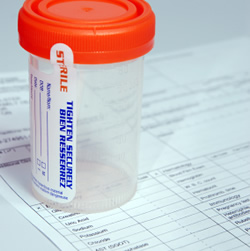FHSAA Pledges Review Of Drug Policies
August 7, 2013
The Florida High School Athletic Association said Tuesday it would examine its policies dealing with performance-enhancing drugs in the wake of the wide-ranging Biogenesis scandal.
Officials with the association announced the review in a conference call with reporters. But they also stressed that the association itself is not allowed to test athletes for performance-enhancing drugs, and that many school districts would have trouble coming up with the resources to do so.
 In Escambia County, athletes as well as participants in non-sports extracurricular activities and clubs must consent to the possibility of being selected for a random drug test.
In Escambia County, athletes as well as participants in non-sports extracurricular activities and clubs must consent to the possibility of being selected for a random drug test.
Roger Dearing, executive director of the association, said the organization’s Sports Medicine Advisory Committee would undertake the review.
The committee’s 15 members, including medical professors and coaches, are charged with considering whether to break out the association’s drug rules into their own policy, rather than having them as part of its sportsmanship policy, and whether new rules might be needed to help crack down on the substances.
Association officials say educating parents and students about the dangers of PEDs and pushing school districts to move quickly against coaches who encourage or ignore PED use will help.
“I think it’s something that we’ve got to put on the front-burner and be vigilant about,” Dearing said.
Dearing said the recent reporting about the Biogenesis clinic in South Florida serves as a “wake-up call” about the drugs’ possible impact on high-school sports. Biogenesis is infamous for its role in a scandal currently rocking Major League Baseball; more than a dozen players have been punished for their links to the clinic, and the New York Yankees’ Alex Rodriguez is fighting a 211-game suspension that would last through at least the end of the 2014 season.
The Miami Herald reported Monday that it “has seen a partial list of alleged clients of Biogenesis from October 2011″ that included high-school students. It did not name the players on the list.
One of the biggest challenges in trying to test students is the financing, Dearing said. The Legislature did provide funding to randomly test about 650 students several years ago, with one student testing positive, but hasn’t funded a program of testing.
The screenings cost about $150 each, meaning to test each of the 283,000 athletes in FHSAA sports would cost around $42 million, Dearing said.
He suggested that a better tack might be to have local districts partner with civic groups or others who could help pay for some testing.
“I don’t think it’s the Legislature’s responsibility to fund, and I don’t think it’s the school districts’ responsibility to fund,” Dearing said.
Dr. Jennifer Roth Maynard, an assistant professor with the Mayo Clinic in Jacksonville, said the advisory committee would begin its review at its next meeting, scheduled for the end of the month.
by The News Service of Florida



Comments